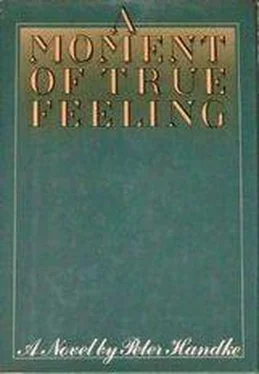Outside on the square a half-naked drunk was bellowing; at the sight of him a mood of smug complicity enveloped many of the diners, who were not only clothed but also more or less sober. A few began talking from table to table, even to Keuschnig. He looked down at his trousers. That’s their kind of solidarity, he thought — though only a short while ago he had thought of solidarity first as the illusion of being taken back into the fold after being cleared of a grave suspicion, and second as a last moment of belonging before one is isolated forever. The innocence of the child, who, while all the others were smirking at each other, was merely frightened by the bellowing! For the first time he was glad to be alone with her.
North of thePlace Clichy, after crossing the Montmartre Cemetery on the raised rue Caulaincourt and turning left into the somewhat quieter rue Joseph-de-Maistre, you come to a dusty, grassless park with a children’s playground in one corner. Keuschnig had lived in the neighborhood some years before and sometimes on Sunday mornings he had put the child, who could barely stand at the time, in the sandbox. Since this park was not far from the Place Clichy, he now headed for it, but took a more roundabout route by way of the Avenue de Saint-Ouen. He saw few SIGNS on the way, and even those seemed to tease rather than threaten him: a single boot in a supermarket cart that someone had left standing in the street; a bus ticket which fell from his hand and blew away every time he stooped to pick it up … The beggar who twittered like various kinds of birds was still standing on his old corner, to which the ladies of the neighborhood were dragged by their leashed dogs, which proceeded to piss right next to him, so that their owners felt obliged to give him a pittance to compensate for the humiliation … It gave Keuschnig a sense of well-being to walk slowly through the bright, hot streets with the child hop-skip-jumping beside him. He hadn’t wanted to go to the movies because to judge by the pictures at the Place Clichy the films seemed to take place entirely indoors. What a lot of automatic machines are still out of order around here, he thought in passing, almost cheerfully: washing machines, stamp vending machines, and now this photostating machine outside the stationery store, which even in those days had an EN PANNEsign on it. The air was so hot that vapor formed in cellophane packages of crepes outside a bakery. A thin bony man overtook Keuschnig; of all the people on the street, he was the only one who seemed to be in a hurry; his prominent shoulder blades jiggled under his tight-fitting summer jacket. Here and there North African workers, apparently grown accustomed to the lack of space, were sitting on doorsteps, waiting for the end of the lunch hour. A pale counter girl, with a name tag on the collar of her apron, stepped out of a pastry shop, closed her eyes, sighed and bent back her head so as to get the sun in her face. Another girl, carrying a cup of coffee, crossed the street very very slowly, step by step, for fear of spilling the coffee. Keuschnig stopped still and without a word from him Agnes stopped too — because it was so hot, just plain hot. The street trembled as the Métro passed inaudibly underneath. Keuschnig felt the tremor. This is it! he thought. Yes, this is it! — an experience that he had given up expecting.
They walked in a primeval heat, in which far and wide there was no more danger, step by step like the girl with the cup, but for the pleasure of it, not because they had to. Keuschnig no longer had to adjust to the child’s slow unthinking gait; now he walked like that of his own accord, and the summer breeze, in which a branch crackled now and then, nothing more, seemed a fulfillment, yet still full of promise. High in the air a plane flew by and for a short moment the light changed, as though the shadow of the plane had passed quickly over the street. He wanted to shout at far distant trees that were gleaming in the sun and tell them to stay just as they were. Why didn’t anyone speak to him?
In a side street Keuschnig saw the house he had lived in some years before, with a maple tree in front of it that reached just up to the windows of his old apartment. In that moment he was overcome with bitterness at all the wasted time since then and with disappointment with himself. Since then he had experienced nothing, undertaken nothing. Everything was as muddled as ever, and death, from which he had then been safe, was much nearer. I’ve got to do something, he thought in despair, and no sooner had the thought passed through his mind than he said to the child: “I’m going to start working. I’m going to invent something. I need the kind of job that gives me a chance to invent something.” Agnes, who had heard nothing but his voice, responded with a carefree hopping step, and for the first time in ages his feeling toward her was one of friendliness, rather than of absent-minded indifference and anxious love.
Thinking he’d like to read in the playground, he went to a bookshop and bought a paperback volume of Henry James short stories. Again, as on the morning “when it all began,” he saw a marble plaque in memory of a Resistance fighter who had been shot by the Germans on that spot. This one, too, had a withered fern under it. He told the child what had happened thirty years ago. The man’s first name had been Jacques, and he had been killed at this same season, in late July. And today the Square Carpeaux was as dusty as it had been three years ago, yet as never before. — Keuschnig felt that he was close to discovering the insignificant detail which would bring all other things together.
The child, at least, seemed to be changing. Only a few days before, she had gone down the Métro stairs haltingly, always advancing the same foot and drawing the other behind it; now her movements as she walked down the steps to the playground were one smooth continuous flow, left foot right foot, left foot right foot. At first she only stood at the edge of the playground, looking on. The streets had been almost deserted, but here on the square there was suddenly a crush of children and grownups; most of the grownups were elderly Frenchwomen and young foreign women. Keuschnig sat down on a bench. Agnes was standing there deep in thought. He touched her gently with his foot, and without looking around at him she smiled, as though she had been waiting for this touch. In her self-sufficiency she radiated a pride so objective that it carried over to him. If only he could perceive with her! That would drive away his surfeit and disgust. Who was he to look down on these tired, discontented women dragging behind them and occasionally slapping their screaming children, who now and then forgot their misery long enough to hop-skip-jump for a moment. One of these women, plagued by a bawling, wriggling child, was covertly getting ready to strike when she noticed that Keuschnig was looking at her. Suddenly she let down her guard, and her eyes revealed all her anger and hopelessness, as though she knew she was being looked at by a kindred spirit, from whom she had no need to hide.
How much there was to see, and no trace of disgust dismissed the sights as familiar! The tall, tall ash trees and the dark, dark square … So little sun shone through that the women, especially the younger ones, kept moving their chairs into the few sunny spots. Now and then one of them would stand up and toss a plastic shovel into the sand to stimulate her child — who would scarcely take notice — or to reassemble a collection of toys around a child, who had scattered them … Often, when a child misbehaved, the mother would clap her hands menacingly, without getting up from her bench, and at the sound the pigeons, which had been strolling around in the sand among the children, would fly up into the air. One woman, while watching a child, who had just called out to her because he was about to let himself drop from the climbing bars, rocked an occupied baby carriage with one hand, and held the other over her once again swelling belly. Another woman was counting the stitches on her knitting needle, and still another blowing sand out of the eyes of a crying child. Many foreign names were called: TIZIANA! FELICITAS! PRUDENCIA! … Misery and loneliness descended like a last possible harmony on the swarming, dust-veiled square, on the women with their plastic bags beside them, on the park guardian dozing in his octagonal sentry box yet ready to take action at any moment, on the children, who drummed with their heels on the sheet metal before starting down the squeaking slides, while the next in line were impatiently hopping about at the foot of the ladders, on this constantly repeated, spasmodic to-and-fro, in which nothing happened — even the sewer gratings were plugged with dust and sand; on this whole wretched playground that smelled of soap and resounded with the children’s shrill clamor, the women’s cries, the guardian’s police whistle, and the rasping of roller skates on concrete.
Читать дальше












